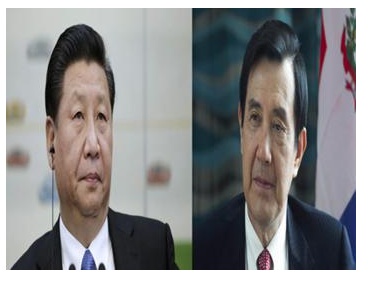
The presidents of China and Taiwan will meet this weekend in Singapore, the two sides said Wednesday, in the first such talks between the rivals since they split at the end of a civil war in 1949.
The surprise meeting follows a gradual warming of relations with Beijing since Taiwan’s President Ma Ying-jeou of the China-friendly Kuomintang (KMT) came to power in 2008.
China hailed the talks as a milestone in a dispatch on the state Xinhua news agency that said the two sides would “exchange views on promoting the peaceful development of cross-Strait relations”, referring to the stretch of water that separates them.
“The meeting will mark a start of direct exchange and communication between leaders of the mainland and Taiwan,” it cited Zhang Zhijun, head of the mainland’s Taiwan affairs office, as saying.
“I believe the meeting will gain wide support from all walks of life across the Strait and the international community,” he added.
There were few other details on the substance of the summit. Ma’s spokesman said that the goal is to “secure cross-Strait peace,” but that there would be no agreement signed nor any joint statement issued.
Beijing still considers the island part of its territory, even though they have been governed separately since Nationalist leader Chiang Kai-shek and his KMT forces fled to Taiwan after losing the civil war to Mao Zedong’s communists.
To avoid the risk of a protocol problem over the title “President”, Xinhua cited Zhang as saying that the two leaders will call each other “Mister”.
The historic meeting comes as public sentiment in Taiwan has turned against closer relations as fears over Beijing’s influence grow.
Taiwan’s Premier Mao Chi-kuo is due to brief lawmakers Wednesday about the summit and the Presidential Office’s secretary-general Tseng Yung-chuan will later address legislators.
Around 50 protesters gathered outside the parliament building Wednesday, with police also stepping up their presence.
The White House gave a cautious welcome to the announcement of a meeting between its major rival, China, and regional ally Taiwan.
“We would certainly welcome steps that are taken on both sides of the Taiwan strait to try and reduce tensions and improve cross-Strait relations,” said spokesman Josh Earnest. “But we will have to see what actually comes out of the meeting.”
Taiwanese wary
Ma’s hopes for a meeting with Xi have previously been dashed, despite improved relations.
He had wanted to meet the Chinese leader at an APEC meeting in Beijing in November but said China had refused.
“This is a milestone in cross-Strait relations,” said Professor Chao Chun-shan, an expert in mainland affairs at Tamkang University in Taipei.
“It should be helpful for the stabilisation of the region,” he told the Apple Daily.
Ma will step down next year after a maximum two terms and the main opposition China-sceptic Democratic Progressive Party (DPP) is expected to win the presidential election in January.
The KMT suffered its heaviest-ever local election defeat last year, with its China-friendly strategy a major factor.
While closer ties with Beijing have brought trade pacts and a tourism boom, many voters feel big business has benefited, rather than ordinary Taiwanese people.
There are also concerns over lack of transparency-last year saw the unprecedented occupation of parliament by student protesters angered by a trade agreement they said had been made in secret.
But Ma has repeatedly defended his China-friendly policies, saying they have brought stability to the region.
The KMT adheres to the “1992 consensus”-a tacit agreement between the party and Beijing which acknowledges there is “one China,” but allows each side their own interpretation.
Ma has warned against the consequences of diverging from the 1992 consensus, which the DPP does not recognise.
DPP candidate Tsai Ing-wen has repeatedly said that she will maintain the status quo if elected president in January, but is likely to face pressure from pro-independent voices within her own party.
The KMT replaced its pro-China presidential candidate last month as the deeply divided party struggles for public support.



